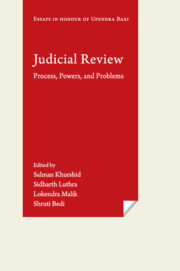Book contents
- Frontmatter
- Contents
- Foreword
- Editors' Note
- Introduction
- 1 The Inadequacy of Judicial Enforcement of Constitutional Rights Provisions to Rectify Economic Inequality, and the Inevitability of the Attempt
- 2 The Interplay of Law and Politics in India
- 3 Beating the Backlog: Reforms in Administration of Justice in India
- 4 Judicial Review: Perspectives and Reflections for the Twenty-First Century
- 5 When ‘Creeping Jurisdiction’ Goes Awry: The Social Action Litigation to Ban Surrogacy
- 6 Judicial Review and the Democratic Judge
- 7 Judicial Review: A Tool to Shape Constitutional Jurisprudence
- 8 The Baxian Bioscope on Indian Judicial Process
- 9 Judicial Activism, Courts, and Constitutional Revolutions: The Israeli Case
- 10 Democracy, Constitution, and Judicial Review: A Critique
- 11 A Minor Jurisprudence of Pathos: Upendra Baxi as Teacher and Writer
- 12 The Need for Reinventing the Supreme Court as a Constitutional Court
- 13 Appointment of ‘Distinguished Jurists’ as Judges in the Supreme Court of India: A Critical Analysis
- 14 Judicial Dissent and Judicial Review: A Functional Analysis
- 15 The Power of Judicial Review: Judicial Chutzpah or Judicial Desideratum
- 16 Judicial Review of Legislations by Tribunals in India: Law, Problems, and Perspectives
- 17 Criminalization of Membership of Terrorist Organizations in India and the United States of America: Human Rights Concerns
- 18 Article 142 of the Indian Constitution: On the Thin Line between Judicial Activism and Restraint
- 19 Sketching the Limits of Article 142 of the Constitution of India: A Constitutional Necessity
- 20 Constitutional Morality and Judges of the Supreme Court
- About the Contributors
- Index
2 - The Interplay of Law and Politics in India
Published online by Cambridge University Press: 23 January 2020
- Frontmatter
- Contents
- Foreword
- Editors' Note
- Introduction
- 1 The Inadequacy of Judicial Enforcement of Constitutional Rights Provisions to Rectify Economic Inequality, and the Inevitability of the Attempt
- 2 The Interplay of Law and Politics in India
- 3 Beating the Backlog: Reforms in Administration of Justice in India
- 4 Judicial Review: Perspectives and Reflections for the Twenty-First Century
- 5 When ‘Creeping Jurisdiction’ Goes Awry: The Social Action Litigation to Ban Surrogacy
- 6 Judicial Review and the Democratic Judge
- 7 Judicial Review: A Tool to Shape Constitutional Jurisprudence
- 8 The Baxian Bioscope on Indian Judicial Process
- 9 Judicial Activism, Courts, and Constitutional Revolutions: The Israeli Case
- 10 Democracy, Constitution, and Judicial Review: A Critique
- 11 A Minor Jurisprudence of Pathos: Upendra Baxi as Teacher and Writer
- 12 The Need for Reinventing the Supreme Court as a Constitutional Court
- 13 Appointment of ‘Distinguished Jurists’ as Judges in the Supreme Court of India: A Critical Analysis
- 14 Judicial Dissent and Judicial Review: A Functional Analysis
- 15 The Power of Judicial Review: Judicial Chutzpah or Judicial Desideratum
- 16 Judicial Review of Legislations by Tribunals in India: Law, Problems, and Perspectives
- 17 Criminalization of Membership of Terrorist Organizations in India and the United States of America: Human Rights Concerns
- 18 Article 142 of the Indian Constitution: On the Thin Line between Judicial Activism and Restraint
- 19 Sketching the Limits of Article 142 of the Constitution of India: A Constitutional Necessity
- 20 Constitutional Morality and Judges of the Supreme Court
- About the Contributors
- Index
Summary
This chapter assesses the interactions between law and politics in India along the porous boundary that separates them. Upendra Baxi is one of a small number of legal scholars to recognize the importance of this topic, and he was one of the first. He addressed it in an important book early in his career, in 1983, and his interest has not waned. In the mid-1990s, he co-edited a book that focused more heavily on politics (and society) than on law. He also published an important paper in 1993 on judicial discourse which offered insights into interactions between politics and law, and so on. It is thus appropriate to consider the interplay of politics and law here, in a collection of essays in Baxi's honour.
Political analysts have also paid too little heed to this topic. Pratap Bhanu Mehta cited Baxi's 1983 book as a rare exception to a depressing general trend: ‘Most studies of Indian politics pay almost no attention to courts.’ Nor do they tell us much about the broader interplay of politics and law, which is the subject of this chapter. Mehta's comment came in 2006. Eleven years later, little had changed. A study of the Supreme Court blamed both legal scholars and political analysts.
The crucial contributions in various areas of Indian law have largely been written by and for the legal community … [while] contemporary historians as well as studies by political scientists reveal scant interest in the relationship between the Supreme Court and Indian democracy.
This problem has persisted even though, since the 1970s, the Supreme Court has been drawn deeply into the political process where it has exercised immense influence. ‘It is hard to imagine any major issue in Indian political life which has not become the subject of legal contestation. The Supreme Court … intervenes even in the most ordinary of political matters.’ As the legislature and the executive ‘weakened’, it intervened to produce ‘an enlarged understanding of what falls within the Court's ambit’. By setting out the basic structure doctrine, it ‘declared it suitable to judicially consider the fairness of a range of legislation … on non-procedural grounds … [so that] a range of matters that had been part of political life … were transformed into matters of law’.
- Type
- Chapter
- Information
- Judicial Review , pp. 27 - 45Publisher: Cambridge University PressPrint publication year: 2020



